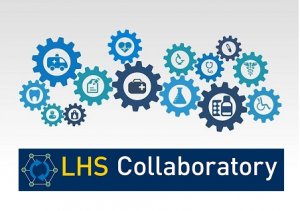Presented By: Department of Learning Health Sciences
LHS Collaboratory 2021-2022 Kick-off Session
Using the Electronic Health Record (EHR)/Structured Data

Presentation 1
The Learning Health (Record) System
Speaker:
Philip R.O. Payne, PhD, FACMI, FAMIA, FAIMBE, FIAHSI
Janet and Bernard Becker Professor and Director, Institute for Informatics (I2), Associate Dean for Health information and Data Science, Chief Data Scientist, at Washington University in St. Louis
This presentation will explore the ways in Biomedical Data Science and Informatics research are helping to realize the potential of EHR technologies in the context of creating an LHS, from the optimization of workflow and human factors, to the generation of reproducible and systematic clinical phenotypes, to the delivery of emergent knowledge to both providers and patients via advance clinical decision support systems.
Presentation 2
Techniques and Challenges for EHR Phenotyping
Speaker:
Lisa Bastarache, MS
Research Associate Professor Department of Biomedical Informatics,
Vanderbilt University
Electronic health records (EHR) contain a wealth of real world data that can be used for research purposes. However, extracting phenotype information from EHRs can be challenging. EHR phenotyping can be divided into two types: (1) Fast phenotyping which seeks to capture a broad swath of the medical phenome, and is often accomplished using coded EHR data (e.g. billing codes) and (2) slow phenotyping that seeks to achieve high precision and recall for a single phenotype, and often uses multiple EHR data types (e.g. medications, text, lab results). This talk will describe specific use-cases for both fast and slow phenotyping, and review challenges that are commonly encountered in creating research-grade EHR phenotypes.
The Learning Health (Record) System
Speaker:
Philip R.O. Payne, PhD, FACMI, FAMIA, FAIMBE, FIAHSI
Janet and Bernard Becker Professor and Director, Institute for Informatics (I2), Associate Dean for Health information and Data Science, Chief Data Scientist, at Washington University in St. Louis
This presentation will explore the ways in Biomedical Data Science and Informatics research are helping to realize the potential of EHR technologies in the context of creating an LHS, from the optimization of workflow and human factors, to the generation of reproducible and systematic clinical phenotypes, to the delivery of emergent knowledge to both providers and patients via advance clinical decision support systems.
Presentation 2
Techniques and Challenges for EHR Phenotyping
Speaker:
Lisa Bastarache, MS
Research Associate Professor Department of Biomedical Informatics,
Vanderbilt University
Electronic health records (EHR) contain a wealth of real world data that can be used for research purposes. However, extracting phenotype information from EHRs can be challenging. EHR phenotyping can be divided into two types: (1) Fast phenotyping which seeks to capture a broad swath of the medical phenome, and is often accomplished using coded EHR data (e.g. billing codes) and (2) slow phenotyping that seeks to achieve high precision and recall for a single phenotype, and often uses multiple EHR data types (e.g. medications, text, lab results). This talk will describe specific use-cases for both fast and slow phenotyping, and review challenges that are commonly encountered in creating research-grade EHR phenotypes.
Livestream Information
Sign In To View Joining InformationExplore Similar Events
-
Loading Similar Events...